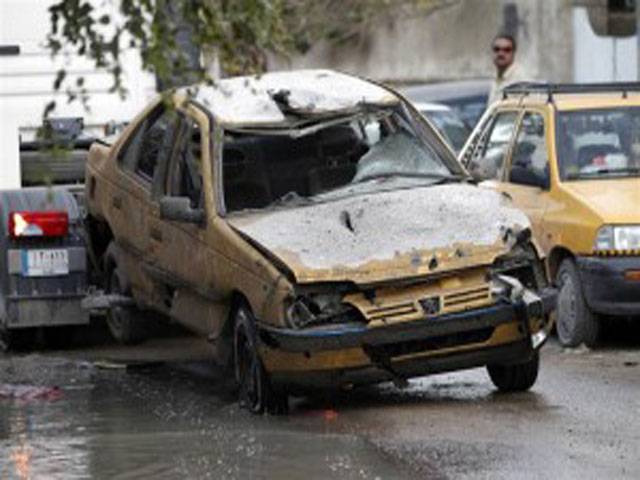HILLA, Iraq - A suicide bomber driving a car killed at least 27 Shia pilgrims at a bus station in the Iraqi town of Mussayab on Thursday, police and medics said.
Police said the bomber drove into a busy station where pilgrims were gathering to return to Baghdad and the northern provinces on their way back from Kerbala, where thousands of Shias make an annual pilgrimage for the Arbain rite. Mussayab is located some 60 km (40 miles) south of the capital Baghdad.
“I was getting a sandwich when a very strong explosion rocked the place and the blast threw me away. When I regained my senses and stood up, I saw dozens of bodies, said Ali Sabbar, a pilgrim who witnessed the explosion. “Many cars were set on fire. I just left the place and didn’t even participate in the evacuation of the victims”.
Although violence is far lower than during the sectarian slaughter of 2006-2007, a total of 4,471 civilians died last year in what one rights group described as a “low-level war” with insurgents.
Meanwhile, thousands of protesters in Sunni-majority areas of Iraq called Thursday for the release of prisoners and the resignation of the Shia premier, the latest in more than a week of anti-government rallies.
Officials sought to head off the demonstrations by beginning a mass release of female prisoners, a key demand of Sunni Arab protesters angered by what they allege is the misuse of anti-terror legislation by the authorities to target their community.
In a sign of cross-sectarian anger with the government of Prime Minister Nuri al-Maliki, meanwhile, hundreds of protesters from mostly-Shia provinces in south Iraq joined the rallies, days after a powerful Shia cleric voiced support for the demonstrations.
As has been the case since they began on December 23, the biggest rallies took place in the western Iraqi province of Anbar, where protesters continued to block off a key highway linking Iraq to Syria and Jordan.
They held up banners reading “State of No Law”, a reference to Maliki’s State of Law political bloc, and calling for the government to release prisoners they alleged were wrongfully detained.
Among the protesters were around 200 from Shia areas of Baghdad and south Iraq who joined the mostly Sunni Arab demonstrators for midday prayers and the rest of the rally.
“This protest is welcomed by all Iraqis - it is not sectarian,” said Ahmed Ali Hussein, a professor at Karbala University.
Jumaa Nasser al-Ani, an Imam at a mosque in Anbar’s capital of Ramadi, added: “We are so happy to see our Shia brothers supporting us - this will give us more strength.”
The addition of Shia protesters came after Shia cleric Moqtada al-Sadr said on Tuesday that he backed the rallies and predicted an impending “Iraqi spring”.
Protests also took place in towns and cities in Nineveh and Salaheddin provinces north of Baghdad, bringing out thousands of demonstrators in all who called for Maliki to resign, anti-terror laws to be scrapped, and criticised the alleged targeting of Sunni politicians by the Shia-led government.
Earlier, justice ministry spokesman Haidar al-Saadi said 11 female prisoners had been released and 13 others had been transferred to jails in their home provinces, two days after Maliki offered to push for the release of hundreds of female prisoners.
The rallies began on December 23, sparked by the arrest of at least nine guards of Finance Minister Rafa al-Essawi, a Sunni Arab and a leading member of the secular Sunni-backed Iraqiya bloc which, while part of Maliki’s unity government, frequently criticises him in public.
Friday, April 19, 2024
Suicide car bomber kills 27 in Iraq

9:58 PM | April 18, 2024
King Charles's cancer ‘eating him alive,' monarch unable to perform duties: Insider
1:02 AM | April 19, 2024
Mehwish Hayat says she would like to work with Aamir Khan
9:59 PM | April 18, 2024
What caused record-breaking rainfall in UAE?
9:58 PM | April 18, 2024
Donald Trump discusses Ukraine, Middle East, NATO with Polish President Duda
9:57 PM | April 18, 2024
'That'll be awesome,' Rohit Sharma on idea of Pakistan vs India Test series
9:17 PM | April 18, 2024
Hepatitis Challenge
April 18, 2024
IMF Predictions
April 18, 2024
Wheat War
April 18, 2024
Rail Revival
April 17, 2024
Addressing Climate Change
April 17, 2024
Justice denied
April 18, 2024
AI dilemmas unveiled
April 18, 2024
Tax tangle
April 18, 2024
Workforce inequality
April 17, 2024
New partnerships
April 17, 2024
ePaper - Nawaiwaqt
Advertisement
Nawaiwaqt Group | Copyright © 2024





